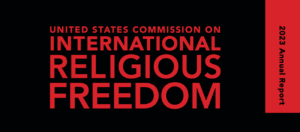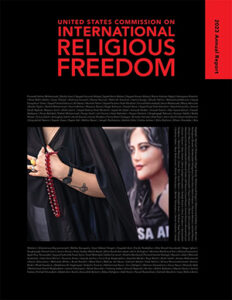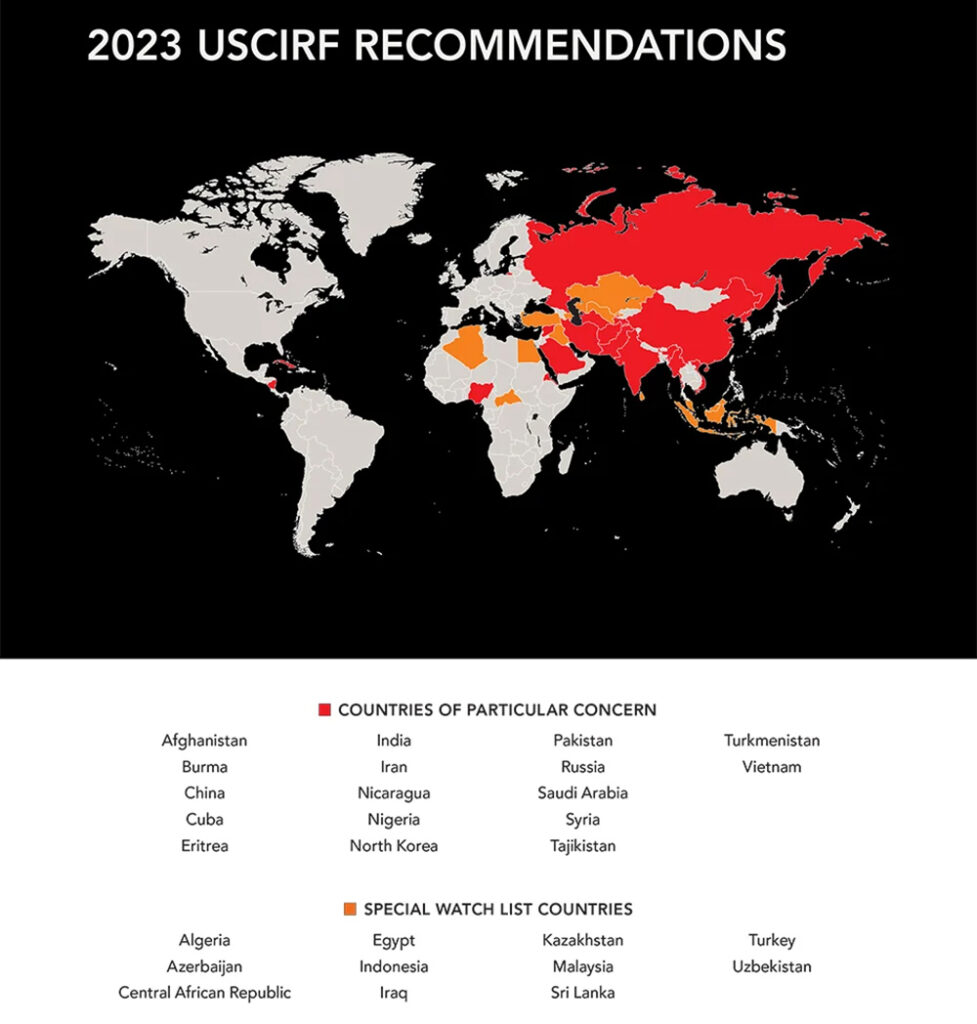The U.S. Commission on International Religious Freedom commended the State Department for designating Cuba and Nicaragua as “Countries of Particular Concern” for the first time but voiced “extreme disappointment” the department failed to include Nigeria and India.
The commission also urged the U.S. government not to issue waivers to any nations on the CPC list and to hold those countries accountable through sanctions.
 The CPC designation is reserved for nations whose governments engage in or tolerate “systematic, ongoing and egregious violations.”
The CPC designation is reserved for nations whose governments engage in or tolerate “systematic, ongoing and egregious violations.”
Pointing to rising authoritarianism and the targeting of religious minorities, the commission in its annual report recommended 17 nations receive CPC designation.
The commission affirmed the U.S. Department of State’s action last November designating 12 nations as Countries of Particular Concern: Burma (Myanmar), China, Cuba, Eritrea, Iran, North Korea, Nicaragua, Pakistan, Russia, Saudi Arabia, Tajikstan and Turkmenistan.
“In Cuba, religious freedom conditions in 2022 worsened considerably, with the government seeking total dominance over religious life in the country,” the commission report stated.
The commission also noted Nicaragua singled out Roman Catholics for persecution by imprisoning priests, forcing church-affiliated organizations to close and barring Catholic rituals.
Violence and atrocities in Nigeria
Commissioners expressed concern about the omission of Nigeria, Afghanistan, India, Syria and Vietnam from the State Department’s CPC list—action the commission previously has urged and in spite of the State Department’s “own reporting documenting the nature and extent of the religious freedom violations in those countries.”
The commission has recommended CPC status for Nigeria since 2009, Syria since 2014, India since 2020 and Afghanistan since 2022.
Sign up for our weekly edition and get all our headlines in your inbox on Thursdays
“Nigeria is the most dangerous country in the world for Christians,” Commissioner Frank Wolf, former member of the U.S. House of Representatives, said in a May 1 virtual event marking the release of the commission’s annual report.
In Congress, Wolf was the author of the International Religious Freedom Act and founder of the Tom Lantos Human Rights Commission.
“Rampant violence and atrocities across Nigeria continued to impact freedom of religion or belief for many Nigerians,” the annual report states, pointing to attacks on churches and individual Christians by the Islamic State West Africa Province.
In Nigeria—the most populous nation in Africa with an estimated 219 million people—the country’s criminal code includes a penalty of up to two years imprisonment for blasphemy. In 12 northern states where Islamic Sharia law is employed alongside civil law, longer sentences and even death penalties are in effect for blasphemy.
Human rights in Iran ‘deteriorated’
 The commission’s annual report particularly focuses on Iran, where the government targeted women’s rights protesters and continued a “decades-long campaign” against religious minorities.
The commission’s annual report particularly focuses on Iran, where the government targeted women’s rights protesters and continued a “decades-long campaign” against religious minorities.
“Iranian authorities’ systematic use of sexual and gender-based violence against [women involved in protests] represents a purposeful weaponization of religious conceptions of purity, modesty and gender hierarchy in an effort to shame Iranians out of peacefully asserting their fundamental rights to religious freedom,” the report states.
Religious freedom conditions in Iran that already were “extremely poor” prior to the September 2022 protests “deteriorated considerably due to the government’s severe brutality against Iranians peacefully asserting their religious freedom,” commission Chair Nury Turkel said.
The commission “is disheartened by the deteriorating conditions for freedom of religion or belief in some countries—especially in Iran, where authorities harassed, arrested, tortured and sexually assaulted people peacefully protesting against mandatory hijab laws, alongside their brutal continuing repression of religious minority communities,” Turkel said.
Commission Vice Chair Abraham Cooper urged the Biden administration to “use the CPC designation tool more effectively, as too many of the State Department’s CPC countries are repeatedly named as such each year, but results in little to no substantive change.”
Additions to Special Watch List
Last November, the State Department placed four countries on its “Special Watch List,” one step below CPC designation: Algeria, Central African Republic, Comoros and Vietnam.
In addition to recommending CPC designation for Vietnam, the U.S. Commission on International Religious Freedom recommended Algeria and Central African Republic remain on the Special Watch List.
While the commission continued to recommend CPC status for Vietnam, it voiced hope that the State Department’s adding of Vietnam to the Special Watch List “will encourage the Vietnamese government to take concrete steps to address longstanding religious freedom concerns.”
The commission recommended nine countries be added to the Special Watch List: Azerbaijan, Egypt, Indonesia, Iraq, Kazakhstan, Malaysia, Sri Lanka, Turkey and Uzbekistan.
Additional action items urged
It also recommended the State Department designate seven “Entities of Particular Concern,” a designation reserved for nonstate actors that engage in particularly severe violations of religious freedom. They are Al-Shabaab, Boko Haram, Hay’at Tahrir al-Sham, the Houthis, the Islamic State in Greater Sahara, the Islamic State in West Africa Province and Jamaat Nasr al-Islam wal Muslimin.
The commission urged the State Department not to reissue waivers to sanctions based on other U.S. policy interests, pointing out those waivers have allowed Pakistan, Saudi Arabia, Tajikstan and Turkmenistan to escape penalties.
The commission also requested the Biden administration strengthen the U.S. Refugee Admissions Program, giving priority to “resettlement survivors of the most egregious forms of religious persecution.”
Commissioners issued an additional statement calling on the U.S. government to ban lobbying groups and law firms from representing the Chinese communist government and its interests.
“At the height of Cold War hostilities in 1980, it would have been unthinkable for any reputable firm to take on the Soviet Union as a client. And yet today, untold profits are being raked in by lobbyists willing to whitewash the record and aims of the Chinese Communist Party and government,” the commissioners stated. “It’s time to make this activity illegal.”















We seek to connect God’s story and God’s people around the world. To learn more about God’s story, click here.
Send comments and feedback to Eric Black, our editor. For comments to be published, please specify “letter to the editor.” Maximum length for publication is 300 words.